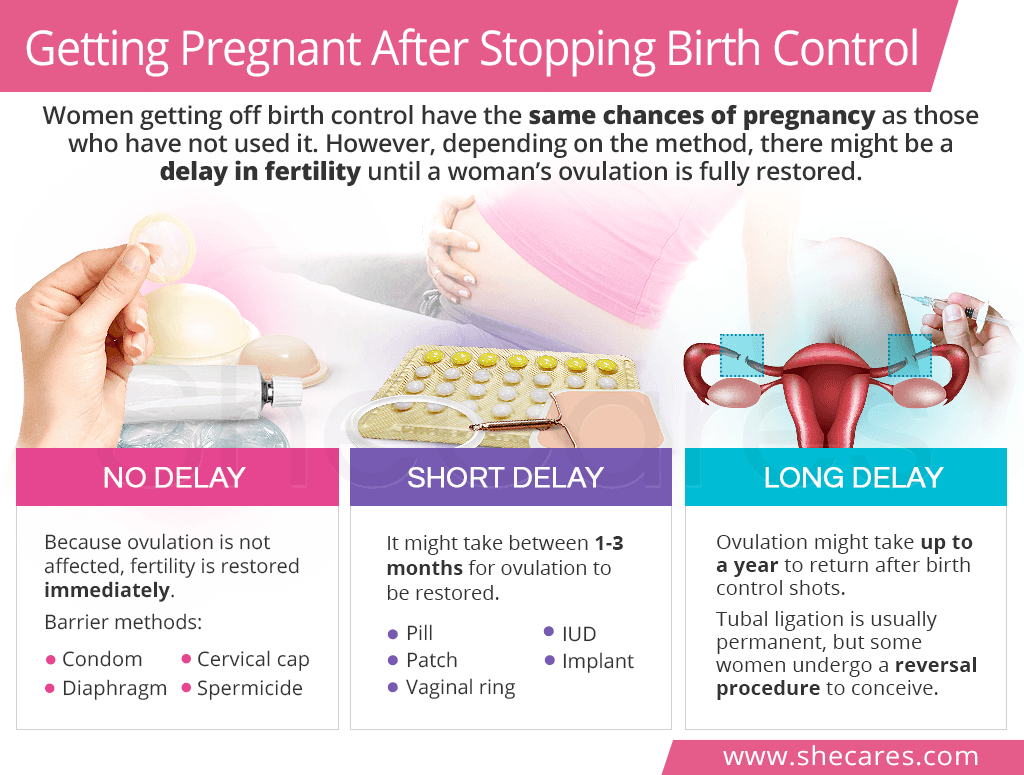Getting Pregnant after Stopping Barrier Methods
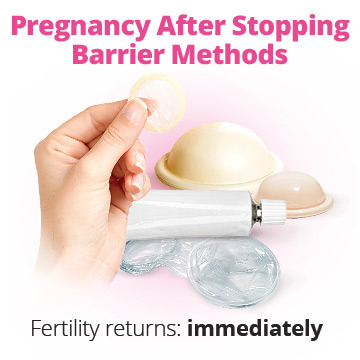
Barrier methods of birth control include male and female condoms, diaphragms, cervical cups, and spermicides of varies sorts. They are used right before vaginal intercourse.
Because these birth control methods work by preventing the sperm from reaching the egg, they do not interfere with a woman's menstrual cycle. As such, a woman's chances of getting pregnant after stopping birth control of this type are immediate.
Getting Pregnant after Birth Control Pills
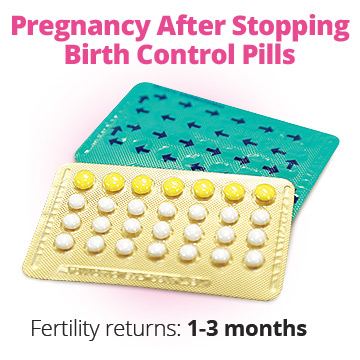
Birth control pills, which might contain only progesterone or progesterone with estrogen, work mainly by stopping ovulation. Depending on the type, they might also change the consistency of the cervical mucus to make it non-sperm-conducive and stop the thickening of the uterine lining to prevent implantation.
Pregnancy after birth control pills may happen as soon as a woman's ovulation is restored, which usually occurs within the next menstrual cycle. It might, however, take up to three months for the cycles to regain their regularity.
Getting Pregnant after Birth Control Patch
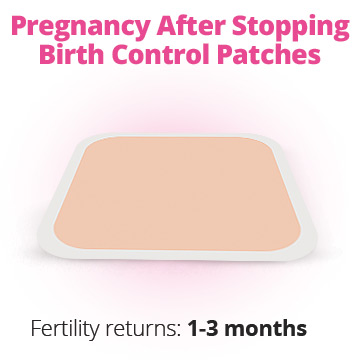
Birth control patches have the same mechanism of action as the pills in terms for interfering with ovulation, with the exception that the hormones are being absorbed through the skin. The most popular patches include Xulane® and Ortho Evra®.
As such, ovulation might take up to three months to return and become regular, although most women typically ovulate within the next few weeks after getting off the patch.
Getting Pregnant after Vaginal Ring Removal
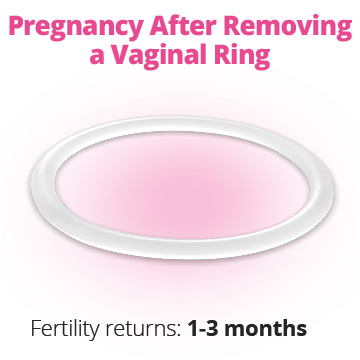
Vaginal rings contain estrogen and progesterone that inhibit ovulatory cycles to prevent conception. The hormones are absorbed through the reproductive tissue and - similarly to the pills and patches - inhibit ovulation.
Getting pregnant after NuvaRing®, Annovera™, or other vaginal ring brands is typically possible within the first menstrual cycle. Ovulation after birth control vaginal ring removal might take up to three months to return and become regular.
Getting Pregnant after Birth Control Implant Removal
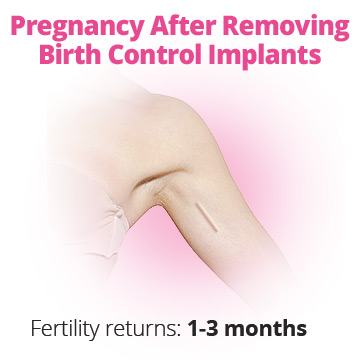
Birth control implants are placed in the arm and release progesterone to prevent pregnancy. Once in place, birth control implants provide contraception for three to five years, depending on the brand.
However, if removed earlier, getting pregnant after Nexplanon®, Implanon®, or other approved brands can take place within the next one to three months. Despite common belief, there are no lingering effects of long-term implant use.
Getting Pregnant after IUD Removal
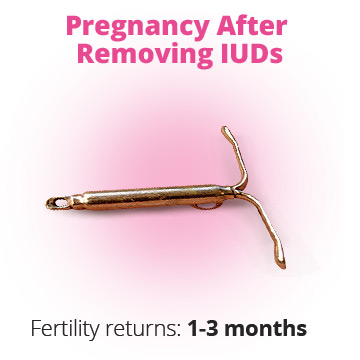
Intrauterine devices (IUDs), as the name suggests, are placed in the uterus. IUDs come in two types: copper and hormonal, each working to prevent fertilization through various mechanisms of action. Depending on the brand, an IUD can be placed for three to twelve years.
Because of their long-term use, most women anticipate a fertility delay after stopping the use of IUD. However, studies have shown that the chances of getting pregnant right after Mirena® removal, similarly to ParaGard® or other IUD brands, are typically restored with the first ovulation within the next four to six weeks.
Getting Pregnant after Birth Control Shots
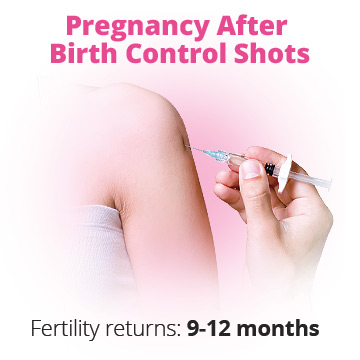
Birth control shots contain progesterone and provide protection for up to 12 weeks by suppressing ovulation. To date, Depo-Provera® is the only approved birth control shot in the United States.
Birth control shots come with the longest fertility delay. Ovulation after Depo-Provera® is projected to return after nine to twelve months. In some cases, it might take up to two years for women to become fertile again. In fact, doctors recommend getting off the Depo shot on year before trying to get pregnant.
Getting Pregnant after Tubal Ligation
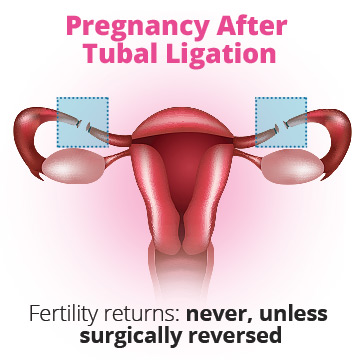
Tubal ligation is a procedure to block or close the fallopian tubes to prevent pregnancy. Although the surgery is often a permanent birth control, some women might undergo a successful tubal ligation reversal procedure.
Its success in terms of restoration of a woman's chances of pregnancy after tubal ligation depends on her age and the extent of damage to the tubes, among other factors. Often times, women become fertile within the following menstrual cycle.
Conclusions
When trying to determine how soon you can get pregnant after stopping birth control, several factors should be clarified. As aforementioned, there are no negative effects of birth control on women's ability to have children, and those who have stopped birth control have equal chances of getting pregnant as those who have not used it.
However, it is important to remember that a woman's ability to get pregnant depends on many other factors as well, most importantly her age, the state of her ovarian reserve, her weight, and her partner's sperm health, among others. So, having one's fertility restored soon after stopping birth control does not guarantee that a couple will actually succeed in getting pregnant quickly. Studies have shown that it might take up to a year for all healthy couples of reproductive age to conceive.
Sources
- American College of Obstetricians and Gynecologists. (2018). Barrier Methods of Birth Control. Retrieved February 18, 2019 from https://www.acog.org/~/media/For%20Patients/faq022.pdf?dmc=1&ts=20120604T2122545757
- Contraception. (2011). Contraceptive failure in the United States. Retrieved February 18, 2019 from https://www.ncbi.nlm.nih.gov/pubmed/21477680
- Contraception and Reproductive Medicine. (2018). Return of fertility after discontinuation of contraception: a systematic review and meta-analysis. Retrieved February 18, 2019 from https://www.ncbi.nlm.nih.gov/pmc/articles/PMC6055351/
- Eunice Kennedy Shriver National Institute of Child Health and Human Development. (2017). What are the different types of contraception? Retrieved February 18, 2019 from https://www.nichd.nih.gov/health/topics/contraception/conditioninfo/types
- Fertility and sterility. (2009). Return to fertility following discontinuation of oral contraceptives. Retrieved February 18, 2019 from https://www.ncbi.nlm.nih.gov/pubmed/19268187
- Food and Drug Administration. (2018). Birth Control. Retrieved February 18, 2019 from https://www.fda.gov/forconsumers/byaudience/forwomen/freepublications/ucm313215.htm
- Medline Plus. (2019). Tubal ligation. Retrieved February 18, 2019 from https://medlineplus.gov/ency/article/002913.htm
- Office on Women's Health. (2017). Birth control methods. Retrieved February 18, 2019 from https://www.womenshealth.gov/a-z-topics/birth-control-methods
- Planned Parenthood. (n.d.). Birth Control. Retrieved February 18, 2019 from https://www.plannedparenthood.org/learn/birth-control
- Seminars in Reproductive Medicine. (2011). Implant contraception. Retrieved February 18, 2019 from https://europepmc.org/abstract/med/11727176
- Washington State University. (n.d.). Hormonal Contraception. Retrieved February 18, 2019 from https://courses.washington.edu/conj/bess/contraception/contraception.htm
- Washington University of St. Louis. (2015). IUD, implant contraception effective beyond FDA-approved use. Retrieved February 18, 2019 from https://source.wustl.edu/2015/02/iud-implant-contraception-effective-beyond-fdaapproved-use/
